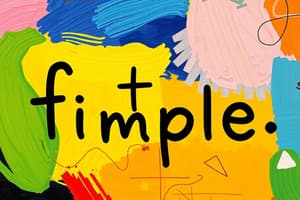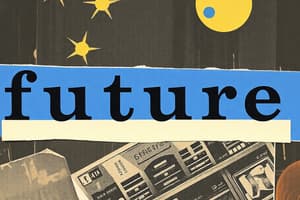Podcast
Questions and Answers
What is the correct formation of the future simple tense in a negative sentence?
What is the correct formation of the future simple tense in a negative sentence?
- Subject + will/shall + not + verb + not
- Subject + will/shall + not + verb (correct)
- Subject + not + will/shall + verb
- Subject + will/shall + verb + not
Which future time expression is NOT typically associated with the future simple tense?
Which future time expression is NOT typically associated with the future simple tense?
- In the future
- Tomorrow
- Continuously (correct)
- Next week
Which of these sentences exemplifies the future simple tense used to express a prediction based on current knowledge?
Which of these sentences exemplifies the future simple tense used to express a prediction based on current knowledge?
- Will you be joining us for dinner tonight?
- I will help you with your work.
- I shall be going to the park later.
- The sun will rise tomorrow morning. (correct)
In which of these scenarios would choosing 'shall' over 'will' be considered more appropriate?
In which of these scenarios would choosing 'shall' over 'will' be considered more appropriate?
Which of these sentences uses the future simple tense to express an intention or determination?
Which of these sentences uses the future simple tense to express an intention or determination?
In which sentence does the future simple tense combine with a modal auxiliary verb to express possibility?
In which sentence does the future simple tense combine with a modal auxiliary verb to express possibility?
In what context is the future simple tense used to express future plans or promises?
In what context is the future simple tense used to express future plans or promises?
Which sentence uses the future simple tense to emphasize a future action?
Which sentence uses the future simple tense to emphasize a future action?
Which sentence illustrates the future simple tense used for speculation about a future event?
Which sentence illustrates the future simple tense used for speculation about a future event?
In which sentence is the future simple tense combined with a modal auxiliary verb?
In which sentence is the future simple tense combined with a modal auxiliary verb?
Flashcards
Future Simple Tense
Future Simple Tense
Expresses actions/events occurring at a future time using 'will' or 'shall' with the base verb.
Formation of Future Simple
Formation of Future Simple
Positive: Subject + will/shall + verb; Negative: Subject + will/shall + not + verb; Interrogative: Will/Shall + subject + verb?
Usage of Future Simple Tense
Usage of Future Simple Tense
Used for predicting the future, offers/promises, spontaneous decisions, intentions, and future facts.
Future Time Expressions
Future Time Expressions
Signup and view all the flashcards
Difference between Will and Shall
Difference between Will and Shall
Signup and view all the flashcards
Emphatic Future Simple
Emphatic Future Simple
Signup and view all the flashcards
Conditional Expressions
Conditional Expressions
Signup and view all the flashcards
Future Speculation
Future Speculation
Signup and view all the flashcards
Combined Tenses
Combined Tenses
Signup and view all the flashcards
Study Notes
Future Simple Tense
- The future simple tense indicates actions or events happening at a point in time in the future.
- It uses the auxiliary "will" (or, less commonly, "shall") followed by the base form of the main verb.
Formation
- Positive: Subject + will/shall + verb
- Negative: Subject + will/shall + not + verb
- Interrogative: Will/Shall + subject + verb?
Usage
- Prediction: Expressing a prediction based on current assumptions or knowledge.
- Promises/Offers: Making promises or offers for future actions.
- Spontaneous Decisions: Making a decision in the moment.
- Intention/Determination: Showing a plan or decision to do something.
- Future Facts: Indicating certain future events (e.g., scientific laws).
Examples
- Positive: She will go to the store tomorrow.
- Negative: He will not be able to attend the meeting.
- Interrogative: Will you be home for dinner tonight?
Contractions
- "Will" contracts to "’ll" (e.g., I’ll go).
Future Time Expressions
- Common expressions include: tomorrow, next week/month/year, in the future, in [time period], soon, later, eventually, by then, one day.
- These expressions frequently accompany the future simple tense.
Distinctions from other future forms:
- Future Continuous: Describes an action in progress at a specific future time.
- Future Perfect: Indicates an action completed before a specific future time.
- Future Perfect Continuous: Shows an action in progress up to a specific future time.
Differences between Will and Shall
- Will: The more common auxiliary verb for expressing the future, used for all persons.
- Shall: Primarily used in the first person (I, we), though less common in modern English.
Mixed Usage/Compounding of ideas
- The future simple can combine with other tenses/structures, like modal verbs.
- Examples include expressing expectation/possibility with a modal auxiliary, conditional expressions, or future plans/promises.
- Nuance and context determine the most appropriate usage.
Emphasis or other specific usages
- Emphatic: Phrases like "I definitely will..." or "I will certainly..." emphasize a future action.
- Combined with Modals: The future simple can be used with other modals. (e.g., "I will certainly have to leave early").
- Speculation: Used to express speculation about future events—(e.g., "I think she will move to another city").
Studying That Suits You
Use AI to generate personalized quizzes and flashcards to suit your learning preferences.




